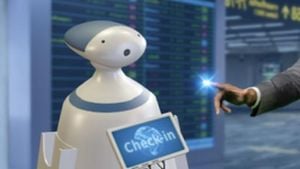The tech industry is currently experiencing seismic shifts, following the unexpected launch of DeepSeek's advanced AI model, R1. Introduced on January 20, 2025, this open-source model has rapidly garnered attention for its capabilities, which are said to rival those of OpenAI's closed-source systems such as GPT, yet at dramatically lower development costs. The moment has sparked discussions around innovation, competition, and the future direction of artificial intelligence.
DeepSeek has emerged from the shadows of Silicon Valley to claim its place at the forefront of AI development with just under $6 million invested, which is minuscule compared to the billions spent by established giants like Microsoft and Nvidia. The launch of R1 not only unsettled these major players but also erased nearly $1 trillion from the stock market on the heels of its announcement. Investors and companies alike are now scrambling to reassess the dynamics of the AI sector as this Chinese startup introduces what many are referring to as "AI's Sputnik moment."
Roi Ginat, cofounder and CEO of EndlessAI—a company focusing on video AI technology—noted, "DeepSeek's success could widen the pool of who can develop AI technology and who can access it." He captures the sentiment echoing across many corners of the tech industry, invigorated by the prospect of democratizing AI development. No longer will innovative AI solutions be the sole domain of tech behemoths.
This development arrives even as the tech leaders commit immense financial resources to AI; for example, Microsoft has pledged $80 billion toward AI infrastructure this year. Comparatively, DeepSeek's cost-effective model suggests there may be alternative pathways to AI advancement, making it feasible for smaller players to enter the fray and contend against industry stalwarts.
Tom Serres, co-founder of Nautilus Asset Management, addresses the cultural shifts within this burgeoning ecosystem, warning, "If Big Tech continues to dominate the AI era, we risk cultivating a culture where users are products and their data is the most valuable commodity." The entry of DeepSeek opens the door for myriad smaller tech companies to innovate where they previously could not, potentially balancing the scales against the dominance of larger firms.
Besides the immediate market reactions, DeepSeek's arrival is poised to redefine traditional expectations about AI model development. Prior to DeepSeek, it was widely perceived within the industry—voiced by the likes of Joseph Geraci of NetraMark—that the large-scale resources and computing power required for significant AI projects posed barriers to smaller organizations. Geraci pointedly remarked, "The AI currently dominating cannot be trained on consumer-level computers," highlighting the exclusivity of advanced AI capabilities.
Yet, with R1 making strides, there's growing confidence among executives and analysts alike about the model's potential impact. Matthew Putman, CEO of Nanotronics, emphasized the principle underlying this shift, saying, "AI models can be built more affordably and applied far beyond large language models." Putman's perspective offers reassurance to those exploring AI outside the shadow of the tech giants.
The success and open-source nature of DeepSeek's offerings have sparked debates about the broader AI development strategies. OpenAI's closed system, focused on safety, contrasts sharply with DeepSeek's open-source methods. Satya Nitta, cofounder and CEO of Emergence AI, remarked, "DeepSeek R1 is a meaningful advance, spotlighting the power of open source and setting a new benchmark for reasoning." These discussions may lead to shifts not only within AI capabilities but also how companies view barriers to entry for innovation and investments.
Despite the excitement, experts urged caution. The entry of DeepSeek has reignited questions around cybersecurity and regulatory frameworks. Risks are presented by open-source models if they are not sufficiently aligned with ethical and safety norms. White House advisor David Sacks cautioned about potential misuse of the open-source technology, warning it may lead to repercussions similar to those experienced with other tech models like TikTok.
Nonetheless, the exhilaration of innovation is palpable! Startups are finding hope, armed with the knowledge they can leverage DeepSeek's technologies and make their mark. With the barrier to entry lowered, many aspire to specialize by building applications targeting specific sectors such as healthcare, law, engineering, and more.
Reflecting on DeepSeek's impact, it's evident the tides of innovation are turning once again. The tech industry is renowned for its ability to adapt and reinvent itself, often finding opportunities within challenges. The reaction from the stock market, which quickly rebounded after the initial dip, suggests investors are optimistic about the prospects of cheaper and more accessible AI for everyday users.
DeepSeek may be small, but with its open-source model, it has demonstrated the fragility of the long-held assumption of extensive financial resources as the only path to advanced AI development. We stand on the brink of potentially reshaping the tech industry's foundational principles, and as the battle for the AI future heats up, one thing is certain—innovation will continue to race forward.



